Buntingford, Hertfordshire
Up to 1834
A parliamentary report of 1777 recorded a parish workhouse in operation at Sandon with accommodation for up to 25 inmates.
After 1834
Buntingford Poor Law Union was formed on 29th June 1835. Its operation was overseen by an elected Board of Guardians, 19 in number, representing its 16 constituent parishes as listed below (figures in brackets indicate numbers of Guardians if more than one):
Hertfordshire: Anstey, Aspeden, Broadfield, Buckland, Cottered, Great Hormead, Laystone (3), Little Hormead, Meesden, Rushden, Sandon (2), Throcking, Wallington, Westmill, Wyddial, Yardley.
The population falling within the Union at the 1831 census had been 6,327 with parishes ranging in size from Broadfield (population 10) to Laystone (1,093). The average annual poor-rate expenditure for the period 1832-35 had been £4,615 or 17s.7d. per head.
The new Buntingford Union workhouse was erected in 1836-7 at a site to the south of the town. It was designed by William T Nash, a Guardian of the Royston Union whose workhouse he designed, together with others at St Ives, Halstead, and Caxton and Arrington. Intended to accommodate 160 inmates, the Buntingford workhouse adopted a somewhat unusual courtyard plan, with the two-storey buildings forming a quadrangle around the inmates' exercise yards. The workhouse location and layout can be seen on the 1897 OS map below.
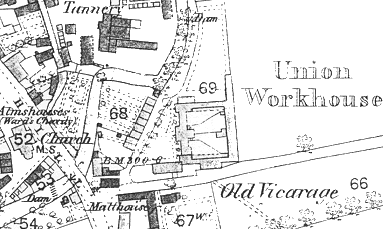
Buntingford workhouse site, 1897
The front block ground floor contained a porter's lodge and clerk's office, dining-halls, kitchen and chapel. Stores, washhouse and laundry were in the basement below, and bedrooms, sick-rooms and the Guardians' board-room were on the floor above. The layout of the ground-floor is shown in the plan below.
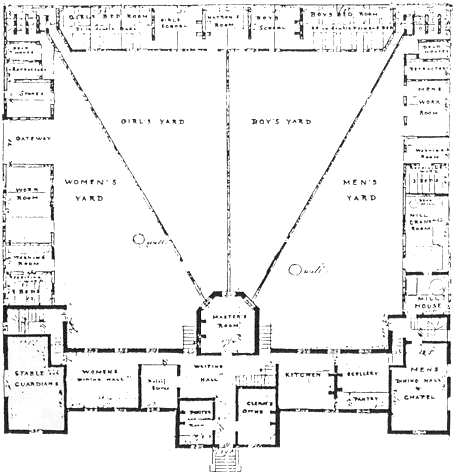
Buntingford workhouse plan, 1836
A new wing was added at the south-west corner of the site in 1872. This contained a new board-room, dining hall and clerk's office.
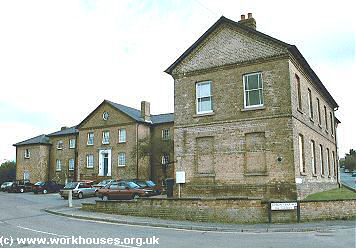
Buntingford from the south-west, 2001.
© Peter Higginbotham.
The Master's accommodation projected from the rear of the front block, overlooking the inmates' yards.
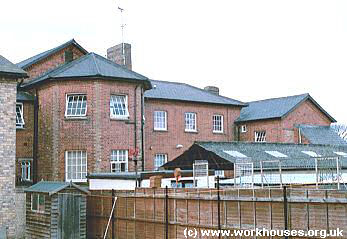
Buntingford from the south-east, 2001.
© Peter Higginbotham.
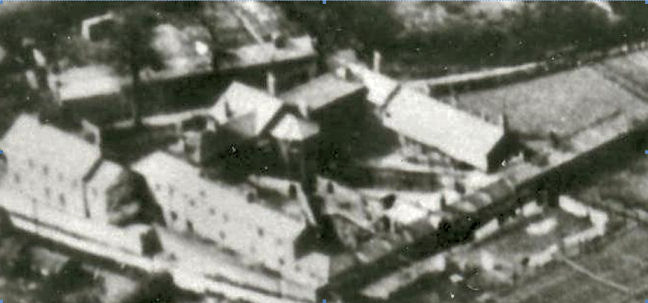
Buntingford workhouse - aerial view, c.1929.
Courtesy of Alison Piano.
The workhouse closed in 1933 and later housed offices of the local Rural District Council. The front block of the building survives.
Staff
Inmates
Records
Note: many repositories impose a closure period of up to 100 years for records identifying individuals. Before travelling a long distance, always check that the records you want to consult will be available.
- Hertfordshire Archives and Local Studies, County Hall, Pegs Lane, Hertford SG13 8DE. Very few records survive — holdings include Guardians' minutes (1846-1930); etc.
Bibliography
- John Corfield (1990) The Building of the Union Workhouse (Hertfordshire's Past, 28)
- Gutchen RM, Truwert E, and Peters G (1984) Down and Out in Hertfordshire — A Symposium on the Old and New Poor Law (Hertfordshire Publications)
Links
- None.
Unless otherwise indicated, this page () is copyright Peter Higginbotham. Contents may not be reproduced without permission.


